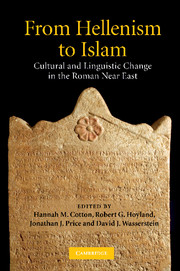Book contents
- Frontmatter
- Contents
- List of figures
- List of tables
- List of contributors
- Preface
- List of abbreviations
- Introduction: documentary evidence, social realities and the history of language
- Part I THE LANGUAGE OF POWER: LATIN IN THE ROMAN NEAR EAST
- Part II SOCIAL AND LEGAL INSTITUTIONS AS REFLECTED IN THE DOCUMENTARY EVIDENCE
- Part III THE EPIGRAPHIC LANGUAGE OF RELIGION
- Part IV LINGUISTIC METAMORPHOSES AND CONTINUITY OF CULTURES
- Part V GREEK INTO ARABIC
- 14 The Nabataean connection of the Benei Ḥezir
- 15 Greek inscriptions in transition from the Byzantine to the early Islamic period
- 16 Arab kings, Arab tribes and the beginnings of Arab historical memory in late Roman epigraphy
- 17 Greek, Coptic and the ‘language of the Hijra’: the rise and decline of the Coptic language in late antique and medieval Egypt
- 18 ‘What remains behind’: Hellenism and Romanitas in Christian Egypt after the Arab conquest
- Index
16 - Arab kings, Arab tribes and the beginnings of Arab historical memory in late Roman epigraphy
Published online by Cambridge University Press: 01 March 2010
- Frontmatter
- Contents
- List of figures
- List of tables
- List of contributors
- Preface
- List of abbreviations
- Introduction: documentary evidence, social realities and the history of language
- Part I THE LANGUAGE OF POWER: LATIN IN THE ROMAN NEAR EAST
- Part II SOCIAL AND LEGAL INSTITUTIONS AS REFLECTED IN THE DOCUMENTARY EVIDENCE
- Part III THE EPIGRAPHIC LANGUAGE OF RELIGION
- Part IV LINGUISTIC METAMORPHOSES AND CONTINUITY OF CULTURES
- Part V GREEK INTO ARABIC
- 14 The Nabataean connection of the Benei Ḥezir
- 15 Greek inscriptions in transition from the Byzantine to the early Islamic period
- 16 Arab kings, Arab tribes and the beginnings of Arab historical memory in late Roman epigraphy
- 17 Greek, Coptic and the ‘language of the Hijra’: the rise and decline of the Coptic language in late antique and medieval Egypt
- 18 ‘What remains behind’: Hellenism and Romanitas in Christian Egypt after the Arab conquest
- Index
Summary
As a historian of the late Roman/early Islamic Middle East I read enviously the publications available to historians of western Europe for the same period, such as those by Patrick Geary, Walter Pohl, Peter Heather and others, which treat so well the Roman interaction with and integration of the ‘western barbarians’. Geary's point regarding the Franks that ‘their very existence as well as every phase of their history makes sense only within the context of Roman presence in northern Europe, for their genesis as a people and gradual transformation into the conquerors of much of Europe were from the start part of the Roman experience’ has long struck me as pertinent to understanding the rise of the Muslim Arab Empire. Yet sadly no such studies have been composed treating the same subject in respect of the ‘eastern barbarians’, i.e. the tribes on Rome's eastern frontier, and these tribes never get more than the briefest of mentions in survey works on the Roman/medieval Mediterranean world. Irfan Shahid has done the great service of laying the groundwork with his exhaustively documented volumes on Byzantium and the Arabs, but no one has used these to produce a narrative/discursive study à la Geary or Pohl. Unable to claim to be intrinsic to the formation of Europe, these ‘eastern barbarians’ still suffer from a lack of focused attention and from a lingering sense that their role in the history of the late Roman Empire was minimal. Arabists are less likely to think along these lines, but they rarely have the depth of knowledge of the Roman Empire necessary to redress this imbalance.
- Type
- Chapter
- Information
- From Hellenism to IslamCultural and Linguistic Change in the Roman Near East, pp. 374 - 400Publisher: Cambridge University PressPrint publication year: 2009
- 10
- Cited by



